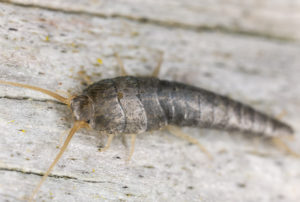These are the most common reasons silverfish enter your home and some of the best ways to prevent them from coming in and destroying your belongings.
They’re tiny, nocturnal and destructive pests that seem to magically appear in your home when you least expect it. These are the most common reasons silverfish enter your home and some of the best ways to prevent them from coming in and destroying your belongings.
What Are Silverfish?
Silverfish are wingless, soft-bodied insects with three long, tail-like appendages. They only grow to the size of one-half to three-fourths of an inch. Because they are nocturnal creatures, the severity of a silverfish infestation may go unnoticed for a long period of time, allowing the population to grow exponentially before intervention.
Though small, these pests can cause enormous damage. Silverfish are drawn to polysaccharides, which are found in paper, book bindings, photos, hair, coffee, dandruff and many other things. They also like cotton, linen and silk. A surefire sign of a silverfish infestation is white patches on your books or a smattering of holes throughout your photo albums.
What Attracts Silverfish?
Like most pests, there are many things that could attract silverfish to your home. You may worry that your home is unclean, damaged or just a natural habitat for the creatures if you spot one. However, just because you have an insect infestation doesn’t mean you’re living in filth or your home has a serious defect.
Food and Water
Silverfish are naturally attracted to food and water. Like all living things, they need sustenance to survive. To a silverfish, the mere presence of food is an open invitation to set up camp. Unfortunately, silverfish aren’t picky eaters and will feel free to gorge themselves on anything that is high in sugars and starch, like:
- Cereals
- Oats
- Flour
- Adhesives
- Paper
- Photos
Moisture
Much like spiders and scorpions, silverfish are drawn to areas with ample moisture, like bathrooms and kitchens. These are the places where they are likely to breed. It’s crucial to always check your plumbing for leaks and unwanted moisture, as this is a prime environment for silverfish.
Keeping your home as dry and warm as is comfortable for you and your family will also help you avoid a silverfish infestation.
Peace and Quiet
Silverfish are fans of the tight, cramped spaces around your home that give them peace and quiet. Seal up cracks and crevices with caulk or a similar material to keep them from intruding.
Dark Spaces
No matter the season, silverfish will seek darker, dingier spaces that receive little to no light.
Dirt and Grime
If you’re worried about attracting silverfish, be sure to stay on top of household cleaning. When other food isn’t around, silverfish have been known to alter their diets to survive on insects and organic matter like human hair. The more garbage and filth around the house, the more likely it is that you could be sharing your home with silverfish.
Tips to Help You Prevent Infestation and Kill Silverfish
Make your home less appealing to silverfish by taking preventative measures, such as:
- Getting rid of cardboard boxes
- Vacuuming regularly
- Keeping dry food in tightly sealed containers
- Storing off-season clothes somewhere dry
If these pests do make their way into your home, there are a few methods that may eradicate them:
- Arranging sticky traps around your home
- Laying out silverfish packs made with poison (best if you don’t have children or pets)
- Placing bread or other starchy foods in a jar wrapped with masking tape so they get trapped
- Calling pest control
Utilizing the services of a pest control company experienced with eliminating silverfish and preventing future incursions into your home is often the best course of action due to the stealthy and prolific nature of these pests.
Say “Good Riddance” to Pesky Silverfish
If your best efforts haven’t deterred silverfish from entering your home, contact OPC Pest Services in Kentucky and Indiana. Since 1972, we have dedicated ourselves to providing our customers with quality pest control for their homes and businesses.
Contact us online today or give us a call at (800) 964-PEST to learn more about our services!